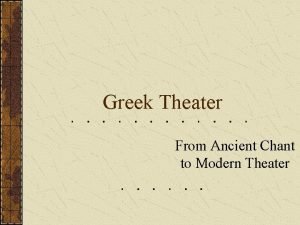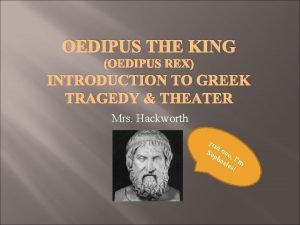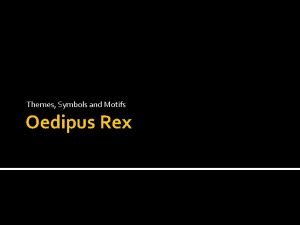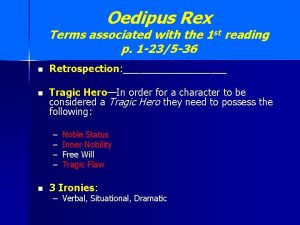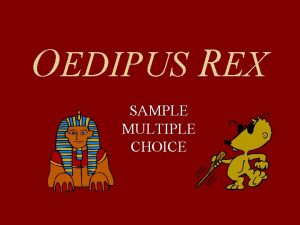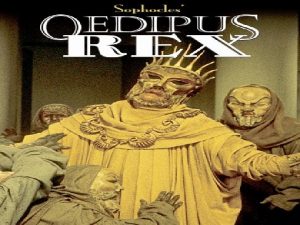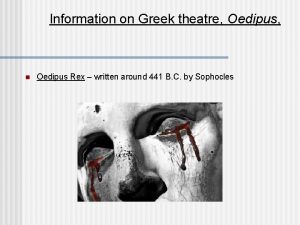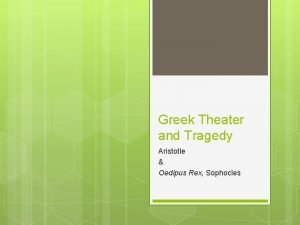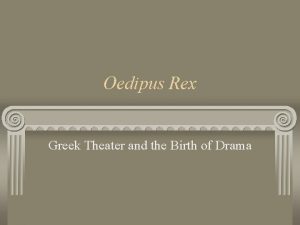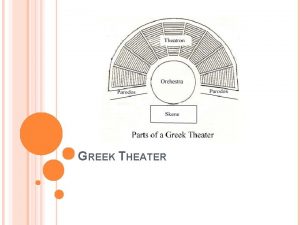Greek Theater An introduction to Oedipus Rex Golden











- Slides: 11

Greek Theater An introduction to Oedipus Rex

Golden Age of Athens • Athens: political and military power in Greece • period from 480 -406 BC famous for flourishing political and cultural life • dramatic arts at center of cultural achievements • ended with Peloponnesian War

Greek Theater • theater evolved from festivals of Dionysus (god of fertility and wine) • Thespis (500 s BC) created a solo drama – one actor performs with masks for different characters – considered first Greek actor • Aeschylus (471 BC) added a second actor – dialogue became possible • Sophocles (468 BC) added third actor – more complex dramatic situations – still used masks to indicate different characters

Parts of a Greek Theater

Layout of Greek Theater • Orchestra – literally “dancing space” – normally circular; at center = thymele (altar) – group of people (chorus) sing, dance, interact with actors on stage • Theatron – literally “viewing space” – where audience sat – usually part of hillside overlooking orchestra

Layout of Greek Theater cont. • Skene – literally “tent” – building directly behind stage – decorated as palace, temple or other building – doors to make entrances/exits • Parados – literally “passageways” – paths for entrances and exits

Pictures of Theaters

Sophocles (c. 496 -406 BC) • • born in Colonus, Greece and died in Athens son of wealthy merchant studied all of the arts plays produced at the Great Dionysia in Athens – annual festival honoring Dionysus – ended with dramatic competitions • won first prize >20 times in competition • wrote >100 tragedies (8 survived) – Oedipus Rex, Oedipus at Colonus, Antigone – Electra, Philoctetes, Ajax, Ichneutai, The Trachiniae

Oedipus Rex • most famous tragedy ever written • first produced in Athens c. 430 BC • Aristotle praised it for its exemplary, well-constructed plot, which is capable of inspiring fear and pity • Greek term to know: – hubris: a type of fatal flaw - pride

protagonist: central character always harmatia (fatal flaw) antagonist: obstacle to the protagonist Act I - peripetia: reversal of fortune Aristotle’s Elements of a Tragedy Act II - anagnorisis: recognition of deeds (protagonist recognizes harmatia) intended to elicit pity and sympathy Act III - catharsis: audience is cleansed by closure of tragedy

THE END
 Greek theater vs modern theater
Greek theater vs modern theater Unity of action in oedipus the king
Unity of action in oedipus the king Main theme of oedipus rex
Main theme of oedipus rex Oedipus the king quiz
Oedipus the king quiz Felix dodds
Felix dodds Oedipus rex sight and blindness
Oedipus rex sight and blindness Oedipus rex study guide
Oedipus rex study guide Prologue of oedipus rex
Prologue of oedipus rex Oedipus rex writer
Oedipus rex writer Oedipus rex context
Oedipus rex context Oedipus rex summary
Oedipus rex summary Oedipus rex practice multiple choice questions answers
Oedipus rex practice multiple choice questions answers
